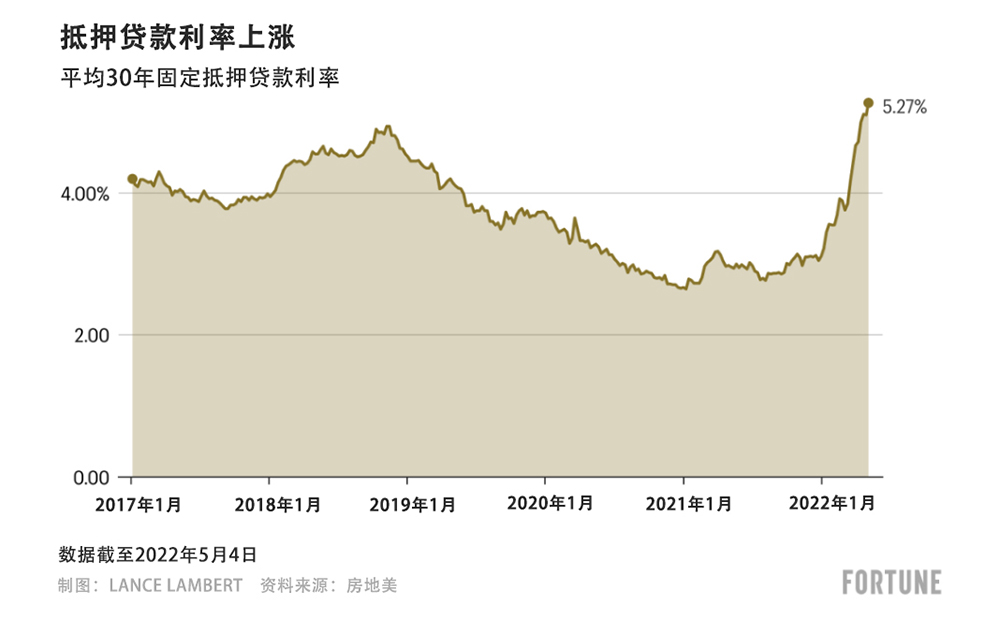美联储加息,房地产市场受冲击
美联储(Federal Reserve)的主席杰罗姆·鲍威尔在5月4日说得非常清楚:美联储已经进入了全力应对通货膨胀的模式。他表示,美联储的目标是将8.5%的年通胀率下降到2%的目标水平。
日益鹰派的美联储首先将在本月提高联邦基金利率50个基点。联邦基金利率是美联储向银行收取的利率。这是自2000年以来最大的单月上调幅度。美联储还表示将开始减持国债和其他债券。这些措施将降低消费者的需求,同时减少对美国经济的货币供应量。
这些政策还将直接冲击美国火爆的房地产市场。房地产市场显然是过去一年推高通货膨胀最大的因素之一。在美联储看来,不可持续的房价上涨如果不能大幅减速,通货膨胀就无法得到控制。过去12个月,美国房价上涨了19.8%。
出于对这些政策调整的预期,金融市场已经开始推高抵押贷款利率。2021年12月,平均30年固定抵押贷款利率为3.11%。5月5日上涨到5.27%,为2009年以来的最高水平。当然,抵押贷款利率上涨应该会把更多的购房人挤出市场,为房地产市场降温。如果借款人以3.11%的固定利率贷款50万美元,月供含本金和利息为2138美元。如果按5.27%的抵押贷款利率计算,30年贷款的月供将提高到2767美元。

美联储在5月4日公布的政策对未来的抵押贷款利率意味着什么?《财富》杂志采访的房地产经济学家们认为,目前不会有太大影响。他们认为,金融市场已经考虑到了美联储的这些动作。
房地产金融服务公司First American的副首席经济学家奥德塔·库什说:“同样值得注意的是,今天的平均抵押贷款利率中已经考虑到了美联储进一步收紧货币政策的影响。”尽管如此,如果未来几个月美联储变得更加激进,抵押贷款利率可能持续上涨,远远高于5%。“如果通胀持续恶化,美联储可能需要变得更加激进,这将给抵押贷款利率带来上行压力。”
美联储计划从6月到8月,每个月减持300亿美元国债和180亿美元抵押贷款担保债券。到9月减持的力度将增加一倍,每个月减持600亿美元国债和350亿美元抵押贷款担保债券。随着债务到期,这将给抵押贷款利率带来上行压力。
库什对《财富》杂志表示:“美联储的资产负债表每个月减少350亿美元抵押贷款担保债券是否会让房地产市场‘变得紧张’,取决于抵押贷款担保债券的需求,它将决定抵押贷款利率是否会进一步上涨。”
抵押贷款利率上涨所带来的经济冲击,应该会给房地产市场降温,降低房价上涨速度。至少HousingWire的首席分析师洛根·莫塔沙米这样认为。
莫塔沙米告诉《财富》杂志:“虽然[房地产市场]还没有降温,但过去两周的热度已经有所下降。”他认为,未来随着利率上涨的影响进一步扩大,房地产市场将会持续降温。
5月4日,鲍威尔对记者表示,这并不会是联邦基金利率最后一次上调。但美联储将在多久之后上调联邦基金利率,取决于未来的通胀情况。鲍威尔称,如果物价没有快速下降,美联储可能会采取更加激进的措施,即使这可能意味着经济衰退的风险。当然,恶性通胀和决绝的美联储,会对房地产市场产生巨大影响。比如在20世纪70年代的通胀周期,飙升的通胀率是在经过几年大幅加息之后才最终得到控制。1981年,平均30年抵押贷款利率超过18%,最终使美国经济和房地产市场陷入衰退。(财富中文网)
译者:刘进龙
审校:汪皓
美联储(Federal Reserve)的主席杰罗姆·鲍威尔在5月4日说得非常清楚:美联储已经进入了全力应对通货膨胀的模式。他表示,美联储的目标是将8.5%的年通胀率下降到2%的目标水平。
日益鹰派的美联储首先将在本月提高联邦基金利率50个基点。联邦基金利率是美联储向银行收取的利率。这是自2000年以来最大的单月上调幅度。美联储还表示将开始减持国债和其他债券。这些措施将降低消费者的需求,同时减少对美国经济的货币供应量。
这些政策还将直接冲击美国火爆的房地产市场。房地产市场显然是过去一年推高通货膨胀最大的因素之一。在美联储看来,不可持续的房价上涨如果不能大幅减速,通货膨胀就无法得到控制。过去12个月,美国房价上涨了19.8%。
出于对这些政策调整的预期,金融市场已经开始推高抵押贷款利率。2021年12月,平均30年固定抵押贷款利率为3.11%。5月5日上涨到5.27%,为2009年以来的最高水平。当然,抵押贷款利率上涨应该会把更多的购房人挤出市场,为房地产市场降温。如果借款人以3.11%的固定利率贷款50万美元,月供含本金和利息为2138美元。如果按5.27%的抵押贷款利率计算,30年贷款的月供将提高到2767美元。
美联储在5月4日公布的政策对未来的抵押贷款利率意味着什么?《财富》杂志采访的房地产经济学家们认为,目前不会有太大影响。他们认为,金融市场已经考虑到了美联储的这些动作。
房地产金融服务公司First American的副首席经济学家奥德塔·库什说:“同样值得注意的是,今天的平均抵押贷款利率中已经考虑到了美联储进一步收紧货币政策的影响。”尽管如此,如果未来几个月美联储变得更加激进,抵押贷款利率可能持续上涨,远远高于5%。“如果通胀持续恶化,美联储可能需要变得更加激进,这将给抵押贷款利率带来上行压力。”
美联储计划从6月到8月,每个月减持300亿美元国债和180亿美元抵押贷款担保债券。到9月减持的力度将增加一倍,每个月减持600亿美元国债和350亿美元抵押贷款担保债券。随着债务到期,这将给抵押贷款利率带来上行压力。
库什对《财富》杂志表示:“美联储的资产负债表每个月减少350亿美元抵押贷款担保债券是否会让房地产市场‘变得紧张’,取决于抵押贷款担保债券的需求,它将决定抵押贷款利率是否会进一步上涨。”
抵押贷款利率上涨所带来的经济冲击,应该会给房地产市场降温,降低房价上涨速度。至少HousingWire的首席分析师洛根·莫塔沙米这样认为。
莫塔沙米告诉《财富》杂志:“虽然[房地产市场]还没有降温,但过去两周的热度已经有所下降。”他认为,未来随着利率上涨的影响进一步扩大,房地产市场将会持续降温。
5月4日,鲍威尔对记者表示,这并不会是联邦基金利率最后一次上调。但美联储将在多久之后上调联邦基金利率,取决于未来的通胀情况。鲍威尔称,如果物价没有快速下降,美联储可能会采取更加激进的措施,即使这可能意味着经济衰退的风险。当然,恶性通胀和决绝的美联储,会对房地产市场产生巨大影响。比如在20世纪70年代的通胀周期,飙升的通胀率是在经过几年大幅加息之后才最终得到控制。1981年,平均30年抵押贷款利率超过18%,最终使美国经济和房地产市场陷入衰退。(财富中文网)
译者:刘进龙
审校:汪皓
Fed Chair Jerome Powell was crystal clear on May 4: The Federal Reserve has transitioned into full-fledged inflation-fighting mode. The goal, Powell says, is to see the 8.5% annual rate of inflation fall back to the Fed’s 2% target rate.
The increasingly hawkish Fed will start by upping the federal funds rate—the interest rate it charges banks—50 basis points this month. That’s the largest single-month hike since 2000. The central bank also said it’ll begin winding down some of its Treasury securities and bond holdings. Those actions should cool consumer demand while reducing money supply in the economy.
These policy moves are also a direct hit to arguably one of inflation’s biggest drivers over the past year: the red-hot U.S. housing market. In the Fed’s eyes, it can’t rein in inflation unless unsustainable home price growth—which is up 19.8% over the past 12 months—decelerates significantly.
In expectation of these policy shifts, financial markets were already driving mortgage rates higher. Back in December, the average 30-year fixed mortgage rate sat at 3.11%. On May 5, it hit 5.27%—the highest level since 2009. Of course, rising mortgage rates should price out more homebuyers and take some steam out of the housing market. If a borrower took out a $500,000 mortgage at a 3.11% fixed rate, they’d owe a monthly principal and interest payment of $2,138. At a 5.27% rate, that shoots up to $2,767 per month over 30 years.
What do the Fed’s policy moves announced on May 4 mean for mortgage rates heading forward? Housing economists interviewed by Fortune say it shouldn’t do too much—for now. They believe financial markets have already priced in these moves by the Fed.
“It's also important to note that additional Fed tightening is already baked into today’s average mortgage rates,” said Odeta Kushi, deputy chief economist at First American, a real estate financial services company. That said, mortgage rates could go well above 5% if the Fed gets even more aggressive in coming months. “If inflation worsens, the Fed may need to be even more aggressive, which may put further upward pressure on mortgage rates.”
Between June and August, the central bank plans to unwind $30 billion in Treasury debt and $18 billion mortgage-backed debt each month. Then in September, the Fed will double the amount of debt it lets expire each month to $60 billion in Treasury debt and $35 billion in mortgage-backed debt. As that debt expires, it could put upward pressure on mortgage rates.
“Whether or not the housing market will be ‘quantitatively uneasy’ with allowing $35 billion in mortgage-backed securities to run off the balance sheet each month will depend on mortgage-backed securities demand, which will dictate whether mortgage rates go up much more,” Kushi tells Fortune.
This economic shock caused by spiking mortgage rates should soften the housing market and see home price growth decelerate. At least that's according to Logan Mohtashami, lead analyst at HousingWire.
"While we [the housing market] aren't there yet, the last two weeks have been softer," Mohtashami tells Fortune. Heading forward, he says, we'll see a lot more cooling as the impact of higher rates sets in.
On May 4, Powell suggested to reporters that this won't be the last uptick in the federal funds rate. But just how quickly the Fed ups the rate will depend on where inflation goes next. If price growth doesn't come down quickly, Powell says, there's a chance the central bank could get even more aggressive even if it means risking a recession. Of course, sticky inflation coupled with a determined Fed would have huge implications for the housing market. Look no further than the inflationary period that took off during the ’70s, which was eventually tamed, but only after years of massive interest rate hikes. In 1981, the average 30-year mortgage rate topped out at over 18%—something that ultimately plunged the U.S. economy and housing market into recession.













